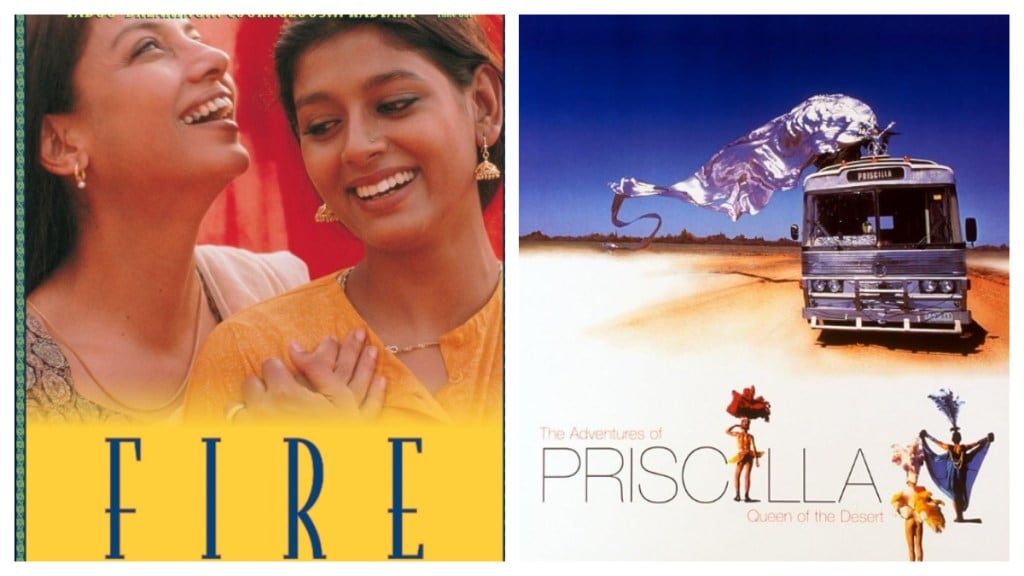By Sreya Deb
Once widely considered profane, films with queer themes and queer representation are now receiving quite an antonymous response. Queerness and queer representation in films, both in Indian cinema and abroad, have now become a matter of great respect and pride, as they should. Films with queer themes were being made sporadically then, as they are now, with likely just as many critics as they had then as well. However, the taboo around their making, and the inclusion of queer persons and characters in the film industries appears to be ebbing.
This Pride Month, the Australian High Commission and PVR Inox screened The Adventures of Priscilla, Queen of the Desert, directed by Stephan Elliott. An Australian musical drama made in1994, the film made its mark when it was screened at the Cannes Film Festival that year. “In recognition of the important role that cinema’s storytelling can play in shaping perspectives, reflecting cultures and driving social change, the screening of the iconic film during Pride Month is as relevant today as it was 30 years ago, when it sashayed onto screens worldwide,” said Australian High Commissioner Philip Green.
As for the Indian film industry, movies like Fire starring Shabana Azmi and Nandita Das in 1996 showed an intimate relationship between two women, My Brother… Nikhil in 2010 spoke of HIV/AIDS awareness, as well as Margarita with a Straw, which, too, was largely centred around a blossoming relationship between two women, one of whom was autistic and wheelchair-bound.
Tracing back through the years, Prem Kapoor’s Badnam Basti from 1971 is touted as the first queer themed film in Indian film history. The story was adapted from a 1957 novel of the same name by Kaleshwar Prasad Saxena, which dealt with themes of bisexuality with one of the lead cast members. The film was thought lost until recently discovered again in 2019 in a film archive in Berlin.
Victim, from back in 1961, directed by Basil Dearden, was the first British film to sympathetically address homosexuality, at a time when it was still not legal in England. Subtle queer themes and subplots have made appearances in films from decades ago, risking bans and public backlashes all along.
More recently, we have also seen films like Sisak and Sheer Qorma, both directed by Indian filmmaker Faraz Arif Ansari, which have been receiving international acclaim. Sisak was India’s first silent LGBTQ love story released in 2017, which now has an 8.2 ranking on IMDb. Sheer Qorma released more recently in 2021, boasted a cast including Shabana Azmi, Divya Dutta and Swara Bhaskar. Ansari himself is openly non-binary and has been advocating for queer cinema for years.
Pataal Lok Season 2, a much-awaited release which reached fans in January this year, also briefly mentioned queer themes with a supporting character. The subplot in the show has since received appreciation and backlash as well.
The film Thank You For Coming which released in 2023 featured trans artist Rani Kohenur, who plays a trans character in the film as well. The film included a performance by Rani Kohenur herself dressed to the nines in drag, performing the song Pari Hoon Main at a club. Trinetra Haldar Gummaraju, an actor and a doctor, has delivered powerful roles in popular web series like Made In Heaven Season 2 and Kankhajura in the recent past, released in 2023 and 2025, respectively, in both of which she portrayed characters aligning with her identity of a transwoman.
Each of these characters were fleshed out with subplots of their own, with Gummaraju impressing audiences and owning her space in the lead cast. Most of these queer artistes, if not all of them, have been quoted in several interviews as saying that these films and series are just a foot in the door of the film industry for the queer community. That without queer storytellers and queer actors from across the LGBTQIA community, representation in films would remain negligible. Queer roles as comic relief are mercifully exiting the narrative, being replaced by characters with backstories, trajectories and power, in the storylines.
There have been several others not mentioned here which escaped the notice of popular media like Geeli Puchi, and earlier Memories in March and Iratta Jeevithum among others.
With films and series such as these doing well not only on OTT platforms, but also doing well on the big screens alike—across genres of thriller, drama and comedy, like Shubh Mangal Zyada Savdhan and Badhaai Do—the hope for queer representation grows slowly but steadily. Not just through queer characters, but with queer actors making it into casting auditions to play them as well. Screenings of LGBTQIA+ films from the 90s now, in the mid-2020s, serve as a pleasant reminder that the yearning for queer themes and representation in films is not new, and is rightfully gaining much awaited momentum through artistes today.


